ADN’s Special Session – Exclusion and Avoidable Disaster Deaths
This page contains the Description, Timetable, Feedback, Recording, and Biographies for the Special Session on Exclusion and Avoidable Disaster Deaths.
Description
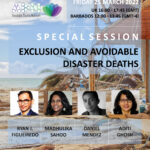
This event was hosted on Friday 25th March 2022. Organised by the Avoidable Deaths Network (ADN) in collaboration with the ADN’s Regional Coordinators for the Caribbean.
The Special Session on Exclusion and Avoidable Disaster Deaths shared knowledge on the intersection between disasters, social exclusion and avoidable deaths.
The webinar shared the risks and impacts of disasters on marginalised communities who have been systematically discriminated against on the basis of their ethnicity, race, religion, sexual orientation, caste, descent, gender, age, disability, HIV status, migrant status or where they live.
Speakers shared their knowledge and experience and discussed how changes in public and social institutions could lessen vulnerability and reduce the number of disaster-related deaths.
This Special Session is was open event, suitable for disaster responders, students, academics, researchers, policymakers, opinion formers, and practitioners interested in avoidable deaths, UN’s Sendai Framework for Disaster Risk Reduction’s Goal A and B, and the Sustainable Development Goals.
Timetable
| Time GMT | Time GMT-4 | Session Title | Speaker |
| 15:45 – 16:00 | 11:45 – 12:00 | Special Session digital platform login on Zoom & Gathering of panellists/speakers | |
| 16:00 – 16:03 | 12:00 – 12:03 | Housekeeping, Welcome Speech & Group Photo | TBC |
| 16:03 – 16:15 | 12:03 – 12:15 | Chair Introductions & Poll | Mr. Krishna Clarke, Dr. Nibedita Ray-Bennett & Dr. Hideyuki Shiroshita (ADN) |
| 16:15 – 16:32 | 12:15 – 12:32 | Social Exclusion, LGBTQ and Avoidable Disaster Deaths | Mr. Ryan J. Figueiredo (Equal AF) |
| 16:32 – 16:49 | 12:32 – 12:49 | Social Exclusion and Avoidable Disaster Deaths | Dr Madhulika Sahoo (Kalahandi University) |
| 16:49 – 17:06 | 12:49 – 13:06 | Children and Avoidable Disaster Deaths in the Caribbean | Mr. Daniel Mendez (ADN Caribbean) and Ms. Denise Robateau (UNICEF Belize) |
| 17:06 – 17:23 | 13:06 – 13:23 | Inclusive Programming – A Mandate, Not a Choice | Ms. Aditi Gosh (Humanity and Inclusion) |
| 17:23 – 17:40 | 13:23 – 13:40 | Q&A | Mr. Krishna Clarke (ADN Caribbean) |
| 17:40 – 17:45 | 13:40 – 13:45 | Poll and Closing Ceremony | Dr. Hideyuki Shiroshita
(ADN) |
Feedback
The following feedback was collected during the session:
Speaker: “Thanks ADN for organising this Special Session on exclusion. We need to speak about it more and more, making the invisible, visible!”
Participant: “It’s a very happy effort to see the collaboration going on. Thank you!”
Recording
Speakers’ Biographies

Mr Ryan Joseph Figueiredo is the Founder and Executive Director of Equal Asia Foundation and is the Deputy Chair of the Women, Gender and Diversity Working Group of the Asia Pacific Refugee Rights Network. Ryan is also a Board Director of Australia’s Forcibly Displaced People Network. Ryan has been named a Human Rights Campaign Global Innovator, a Global Changemaker at Thomson Reuters Foundation and a Global Change Accelerator by the Resource Alliance. He is an alumnus of the Tata Institute of Social Sciences and has trained in clinical trials at the London School of Tropical Medicine, and in population ageing at the University of Oxford.
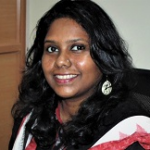
Dr Madhulika Sahoo is an Anthropologist by training, currently working as an Assistant Professor within the Department of Anthropology at Kalahandi University, Odisha, India. Dr. Sahoo is also the Director of Student Welfare Placement and Syndicate Member of the University. She has over 8 years of experience working with forced migrants in India and the UK. Dr. Sahoo has worked with communities displaced by disasters and development. She holds a MA in Refugee studies from the University of East London. Her PhD. research was on the reproductive healthcare of displaced indigenous communities in India. Her research interest includes climate change adaptation, disaster-affected displaced persons and reproductive health.
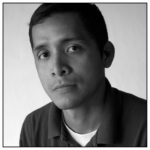
Mr Daniel Mendez is a risk, crisis and disaster manager with over 20 years of experience managing security and crises at the national and local levels. He is a consultant for UNICEF Belize. In addition, Mr Mendez has worked for the Belize Defence Force and the United States Peace Corps. Mr Mendez frequently writes about issues of risk and crisis management, focusing on corporate culture and leadership. Mr Mendez holds MSc in Risk, Crisis and Disaster Management from the University of Leicester.
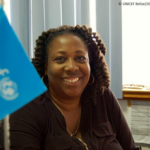
Ms. Denise Robateau is the Education Officer and Emergency Relief Point at UNICEF Belize.
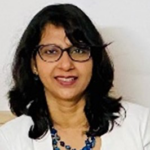
Ms. Aditi Ghosh is the former Deputy Humanitarian Director at IPPF Humanitarian Hub in Bangkok. With over 20 years of experience, Aditi has a wide variety of experience in leading and managing humanitarian programme. With a professional Environmental Management degree, she specialises in humanitarian response and risk reduction programming and led several humanitarian responses spanning over 3 continents and more than 25 countries. She has spent many years working in crises affected areas in managing humanitarian operations from forefront. She has held several leadership positions and has been instrumental in transforming organisations.
Chairs’ Biographies
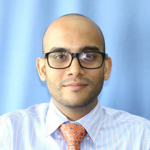
Mr. Krishna Clarke is an ADN Regional Coordinator for the Caribbean. A national of St. Vincent and the Grenadines, with over twelve years’ experience in Banking. Krishna is currently the Risk Analyst for the Caribbean Development Bank and also a lecturer in Project Management at the University of the West Indies. Mr. Clarke holds a MSc. in Risk, Crisis and Disaster Management from the University of Leicester and a MSc. in Risk Management and Financial Regulation from Queen’s University, Belfast. He also has a BSc. in Banking and Finance from the University of the West Indies.
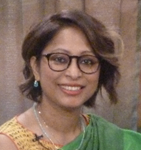
Dr. Nibedita Ray-Bennett is an ADN President, Associate Professor in Risk Management, Programme Director, External Examiner and Fellow of the Higher Education Academy. Nibedita joined the University of Leicester in 2012. Before joining Leicester, she had worked at Warwick, Northumbria and Cranfield Universities. Nibedita is a sociologist specialising in disaster risk reduction and international development. Her research interests include: caste, class and gender in multiple disasters, micro-finance, health security for disaster resilience, securitisation for disaster risk management, reproductive health in disasters, and theory of justice in disaster risk reduction to avoid deaths. Nibedita is the author of Caste, Class and Gender in Multiple Disasters (2009) and Avoidable Deaths (2017).

